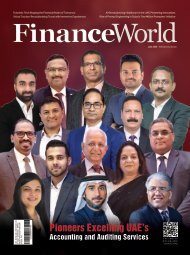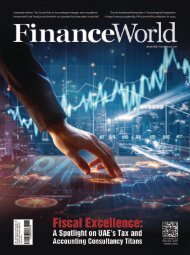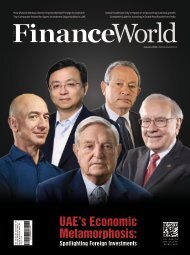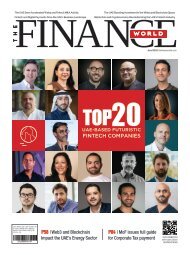The Finance World Magazine| Edition: April 2023
The April edition of The Finance World Magazine (TFW) delves into the world of disruptive investment and its potential to transform markets, featuring an exclusive interview with Hadif Abdullah Zamzam, Senior Associate – Value Creation, Disruptive Investments at Mubadala, who shares his insights on this topic. In addition, we feature interviews with prominent CEOs, including Nilay Ranjan Singh of State Bank India, DIFC, Raman Thiagarajan, CEO & Founder of Zenda, and Naveen Bharadwaj, Group CEO of Trescon. They provide valuable insights on various topics related to business and investments, particularly in the fintech area. Through this edition, we also bring you insights on topics like the UAE and Turkey CEPA agreement that sets the ground for novel business opportunities, cryptocurrency adoption in the UAE and how it is expected to disrupt trade and payment systems, buying and selling properties in Dubai and strategies to boost profitability, and many more articles that offer critical analysis and insights on current trends and issues in the business and investment domains. Keep yourself up to date with all financial sector news with our current news segments. Each person can find something unique from us. We believe our readers deserve real value from what we have to offer.
The April edition of The Finance World Magazine (TFW) delves into the world of disruptive investment and its potential to transform markets, featuring an exclusive interview with Hadif Abdullah Zamzam, Senior Associate – Value Creation, Disruptive Investments at Mubadala, who shares his insights on this topic.
In addition, we feature interviews with prominent CEOs, including Nilay Ranjan Singh of State Bank India, DIFC, Raman Thiagarajan, CEO & Founder of Zenda, and Naveen Bharadwaj, Group CEO of Trescon. They provide valuable insights on various topics related to business and investments, particularly in the fintech area.
Through this edition, we also bring you insights on topics like the UAE and Turkey CEPA agreement that sets the ground for novel business opportunities, cryptocurrency adoption in the UAE and how it is expected to disrupt trade and payment systems, buying and selling properties in Dubai and strategies to boost profitability, and many more articles that offer critical analysis and insights on current trends and issues in the business and investment domains.
Keep yourself up to date with all financial sector news with our current news segments. Each person can find something unique from us. We believe our readers deserve real value from what we have to offer.
Create successful ePaper yourself
Turn your PDF publications into a flip-book with our unique Google optimized e-Paper software.
v<br />
minting process involves creating a new<br />
block, verifying the NFT information<br />
by a validator, and closing the block.<br />
Smart contracts are often employed in<br />
this minting process to assign ownership<br />
and regulate NFT transferability.<br />
When tokens are minted, they are<br />
allocated a distinct identifier that<br />
corresponds directly to a blockchain<br />
address. Every token has an owner,<br />
and the ownership details, such as the<br />
address where the minted token resides,<br />
are publicly accessible. Even if several<br />
identical NFTs are minted, each token<br />
has a unique identifier, and they can be<br />
distinguished from one another. This<br />
is analogous to how general admission<br />
tickets to a movie are issued.<br />
Examples of NFTs<br />
<strong>The</strong> NFT market began with a focus<br />
on digital art and collectibles, but it<br />
has since expanded. OpenSea, a wellknown<br />
NFT marketplace, now offers<br />
various NFT categories, such as:<br />
Photography: Photographers can<br />
create tokens for their work and sell<br />
either full or partial ownership.<br />
Sports: Collections of digital<br />
art featuring celebrities and sports<br />
personalities.<br />
Trading cards: Tokenized digital<br />
trading cards that can either be<br />
collectibles or traded in video games.<br />
Utility: NFTs that can serve as proof<br />
of membership or provide access to<br />
exclusive benefits.<br />
Virtual worlds: NFTs that grant<br />
ownership of items ranging from avatar<br />
wearables to digital property.<br />
Art: An all-encompassing category<br />
that includes everything from pixel to<br />
abstract art.<br />
Collectibles: Examples of NFTs in<br />
this category include Bored Ape Yacht<br />
Club, Crypto Punks, and Pudgy Panda.<br />
Domain names: NFTs that signify<br />
ownership of domain names for your<br />
website(s).<br />
Music: Artists can tokenize their<br />
music, giving buyers the rights that<br />
the artist wishes to provide.<br />
How to Buy NFTs and Start Investing<br />
Once you have comprehended the<br />
applications and unique benefits of<br />
NFTs, you might consider investing in<br />
them. To do so, you will require certain<br />
essential items:<br />
Prospective<br />
investors must<br />
carry out thorough<br />
research before<br />
making any<br />
investment<br />
decisions regarding<br />
NFTs.<br />
• A digital wallet that permits you<br />
to store both your NFTs and<br />
cryptocurrencies.<br />
• You must buy cryptocurrencies,<br />
such as Ether, depending on which<br />
currencies your NFT provider<br />
accepts.<br />
• Once you have purchased your<br />
cryptocurrency, you can transfer it<br />
from the exchange to your wallet.<br />
• Keep in mind that several exchanges<br />
charge a small percentage of your<br />
cryptocurrency purchase transaction<br />
as fees.<br />
NFTs have the potential to simplify<br />
investment processes. For instance,<br />
real estate can be tokenized. A property<br />
can be divided into several parts, each<br />
with different characteristics, such as<br />
being closer to the lake or the forest.<br />
Each piece of land can be unique, priced<br />
differently, and represented by an NFT.<br />
With relevant metadata incorporated<br />
into a unique NFT associated with<br />
each section of the property, real<br />
estate trading can be simplified. This<br />
is a significant advantage since real<br />
estate trading is often a complicated<br />
and bureaucratic process.<br />
NFTs can also represent ownership<br />
in businesses, just like stocks. Stocks’<br />
ownership is already tracked through<br />
ledgers that contain information such<br />
as the stockholder’s name, date of<br />
issuance, certificate number, and the<br />
number of shares. Using blockchain<br />
and NFTs to represent shares provides<br />
the same function as stocks. <strong>The</strong><br />
primary advantage of using NFTs and<br />
blockchain over a stock ledger is that<br />
smart contracts can automate the<br />
transfer of ownership. Once an NFT<br />
share is sold, the blockchain can take<br />
care of the rest.<br />
Prior to making any investment<br />
decisions, prospective investors<br />
should be aware of the advantages and<br />
disadvantages of investing in NFTs. It<br />
is essential to consider the following:<br />
Advantages of Investing in NFTs:<br />
1. Unique ownership: NFTs provide<br />
exclusive ownership of a single<br />
digital asset or data, which can have<br />
significant financial and sentimental<br />
value.<br />
2. Possibility of big returns on<br />
investment: <strong>The</strong> potential for<br />
substantial investment gains exists,<br />
as evidenced by the multi-milliondollar<br />
sales of certain NFTs.<br />
3. Diversification: Investing in NFTs<br />
allows for portfolio diversification<br />
beyond conventional assets such as<br />
stocks and bonds.<br />
4. Support for creators: By investing<br />
in NFTs, investors can support artists<br />
and content creators, potentially<br />
helping them advance in their careers.<br />
Disadvantages of Investing in NFTs:<br />
1. Volatility and risk: NFTs can<br />
be subject to unpredictable price<br />
fluctuations and speculative<br />
behaviour.<br />
2. Lack of regulation: <strong>The</strong> NFT market<br />
is largely unregulated, which could<br />
expose investors to uncertainty and<br />
potential risks.<br />
3. High transaction costs: Purchasing<br />
and selling NFTs on certain blockchain<br />
networks can be expensive due to<br />
high transaction fees.<br />
4. Low liquidity: NFTs may not be<br />
easy to sell quickly due to their low<br />
liquidity.<br />
Before investing in NFTs, potential<br />
investors should consider the benefits<br />
and risks associated with them. In<br />
addition, consumers should thoroughly<br />
research the specific NFTs they are<br />
interested in, as well as the blockchain<br />
technology that supports them and the<br />
legal and regulatory issues associated<br />
with NFT ownership. It is also essential<br />
to avoid investing solely based on hype<br />
or speculation and to only invest what<br />
can be afforded to lose. While NFTs can<br />
offer exciting investment prospects,<br />
investors should approach them with<br />
caution and conduct adequate research<br />
before investing.<br />
<strong>April</strong> <strong>2023</strong> www.thefinanceworld.com 75

















